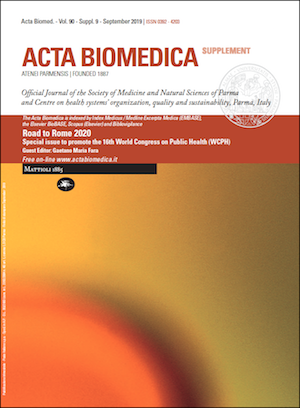Risk Management in healthcare: results from a national-level survey and scientometric analysis in Italy
Keywords:
Keywords: Risk Management in healthcare, Research, Training, Italy.Abstract
Abstract
Risk management in healthcare, intended as all processes employed to detect, monitor, assess, mitigate, and prevent risks in healthcare facilities and safeguard patient safety, is a crucial component of Italy’ National Health Service. Aim of the current study is to assess the role and progress of research and training, in the field of Risk Management.
We carried out a scientometric analysis to quantify and describe scientific outputs on Risk Management at the global and national level, over the last forty years; in addiction, we conducted a national-level cross-sectional survey to systematically retrieve and assess research and training activities within Italian postgraduate medical programmes in Hygiene and Preventive Medicine. We report increasing scientific production on Risk Management-related topics from 1980 to 2017 at the global level (12% annual increase rate). Clinical Trials and Systematic reviews/meta-analysis make up for respectively 5% and 6% of global scientific output. Italy ranks 4th for scientific production, after USA, UK and Germany. 88% of Italian postgraduate medical programmes in Hygiene and Preventive medicine research on Risk Management, 42% through international collaborations. The main research themes are Healthcare-Associated Infections (HAIs) (97%), analysis of organizational models for safety in healthcare (62%), while training is focused on internships (87%) and academic lectures (73%).
While research provides the evidence required to plan, implement and monitor effective interventions in healthcare risk management, training allows its dissemination in a synergic action to promote the value of patient safety and quality of care.
Downloads
Published
Issue
Section
License
This is an Open Access article distributed under the terms of the Creative Commons Attribution License (https://creativecommons.org/licenses/by-nc/4.0) which permits unrestricted use, distribution, and reproduction in any medium, provided the original work is properly cited.
Transfer of Copyright and Permission to Reproduce Parts of Published Papers.
Authors retain the copyright for their published work. No formal permission will be required to reproduce parts (tables or illustrations) of published papers, provided the source is quoted appropriately and reproduction has no commercial intent. Reproductions with commercial intent will require written permission and payment of royalties.







